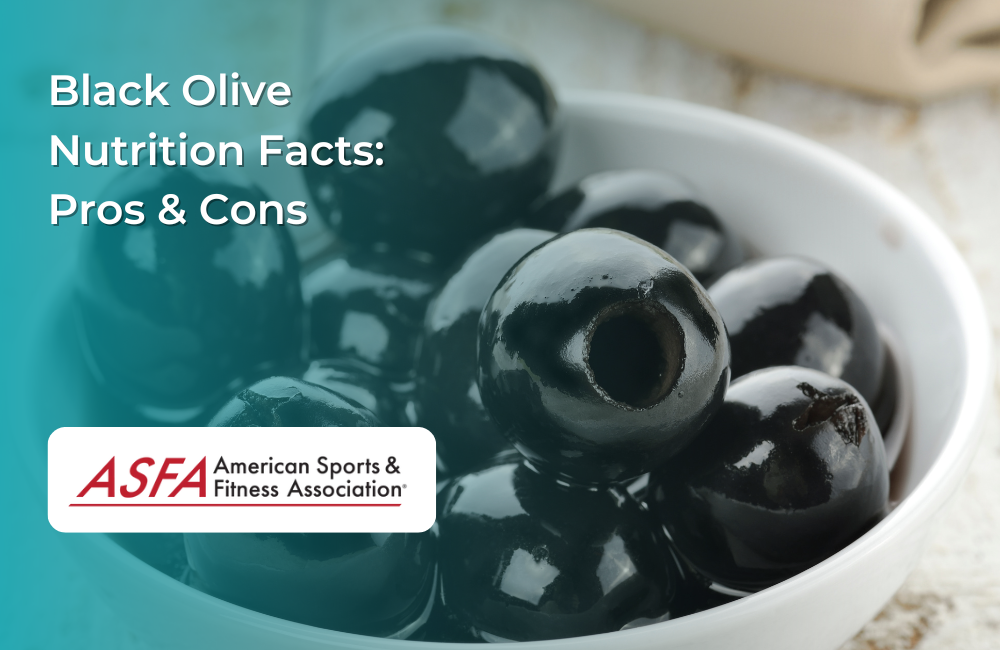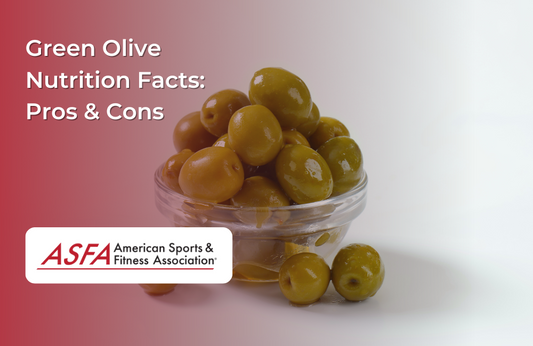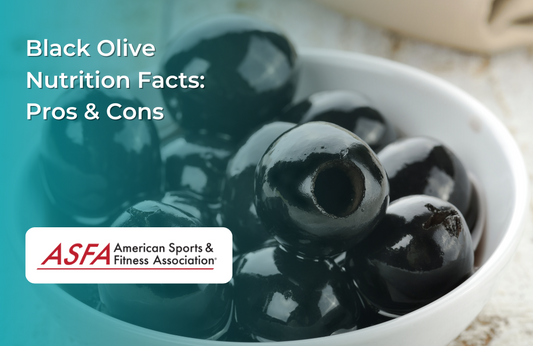Black olives are a flavorful and nutrient-rich fruit commonly used in Mediterranean cuisine. They provide healthy fats, antioxidants, and essential minerals while being low in carbohydrates. However, their sodium content and processing methods should be considered when incorporating them into a balanced diet.
Black Olive Nutrition Facts, Pros, Cons: Per 10 Olives, About 30g
-
Calories: 35
-
Protein: 0.3g
-
Carbohydrates: 1g
-
Fiber: 0.8g
-
Fat: 3.5g
-
Saturated Fat: 0.3g
-
Sodium: 230mg
-
Iron: 0.5mg
-
Vitamin E: 1.2mg
What are Black Olives?
Black olives are a type of olive that has been left on the olive tree until they are fully ripe. This ripening process allows them to develop their characteristic black or dark purple color and rich, fruity flavor. Unlike green olives, which are picked before they are fully mature, black olives are harvested at peak ripeness. This makes them a delicious and nutritious addition to various dishes. Packed with dietary fiber, iron, and vitamin E, black olives offer numerous health benefits, including supporting skin health and reducing oxidative stress. Their robust flavor makes them a popular choice in Mediterranean cuisine and beyond.
Pros of Black Olives
Rich in Healthy Fats
-
Contain monounsaturated fats, which support heart health
-
Black olives are rich in monounsaturated fat, which is beneficial for heart health
-
Help regulate cholesterol levels when consumed in moderation
-
Black olives are rich in oleic acid, a monounsaturated fatty acid that helps regulate cholesterol levels and improve blood sugar control
High in Antioxidants
-
Provide polyphenols and vitamin E, which help reduce oxidative stress
-
May support skin health and reduce inflammation
-
The antioxidants in black olives can help protect against cancer cells by preventing free radical damage
Low in Carbohydrates
-
Suitable for low-carb and keto diets
-
Provide a flavorful, low-calorie addition to meals
Source of Essential Minerals
-
Contain iron, which supports red blood cell function
-
Provide small amounts of calcium and copper for bone and metabolic health
Versatile and Easy to Use
-
Can be added to salads, pasta dishes, sandwiches, or eaten as a snack
-
Available in fresh, canned, or brined varieties
-
A staple in the Mediterranean diet, which is known for its cardiovascular benefits
Cons of Black Olives
High in Sodium
-
Often cured in brine, which significantly increases sodium content
-
Excessive sodium intake may contribute to high blood pressure and water retention
Processing Can Affect Nutrient Content
-
Some canned or processed olives may contain preservatives and additives
-
Choosing fresh or low-sodium varieties can help reduce unwanted ingredients
May Contain Trace Amounts of Acrylamide
-
Certain curing methods may lead to the formation of acrylamide, a compound linked to potential health risks in large amounts
-
Opting for naturally cured olives may reduce exposure
Comparison to Other Olives
When comparing black olives to other varieties, such as green olives and kalamata olives, several differences stand out. Green olives are harvested before they ripen, resulting in a firmer texture and a more bitter taste. In contrast, black olives are sweeter and have a more robust flavor due to their higher oil content. Kalamata olives, a specific type of black olive, are renowned for their distinctive almond shape and rich, fruity taste. While both black and green olives offer health benefits, including healthy fats and antioxidants, black olives tend to have a more intense flavor profile, making them a favorite in many culinary applications.
Storage and Handling
Proper storage is key to keeping black olives fresh and flavorful. To prevent spoilage, store them in an airtight container in the refrigerator. Regularly check for signs of mold or spoilage to ensure they remain safe to eat. If you’re using pitted kalamata olives, it’s a good idea to rinse them with water before consuming to remove any excess salt. Fresh olives can be stored at room temperature, but they should be consumed within a few weeks to avoid rancidity. By following these storage tips, you can enjoy the rich taste of black olives for longer.
Allergy and Intolerance
While black olives are generally safe for most people, some individuals may experience allergic reactions or intolerances. Symptoms can include hives, itching, and difficulty breathing. If you notice any of these symptoms after eating black olives, seek medical attention immediately. Additionally, black olives are high in histamine, a naturally occurring compound that can trigger allergic reactions in sensitive individuals. If you have a known histamine intolerance, it’s best to consume black olives in moderation or consult with a healthcare professional.
Conclusion
Black olives are a flavorful, nutrient-rich fruit that provides healthy fats, antioxidants, and essential minerals, making them a great addition to heart-healthy and low-carb diets. However, their high sodium content and processing methods should be considered, and choosing low-sodium or naturally cured varieties ensures the best nutritional benefits.
FAQs
Are black olives good for weight loss?
Yes, eating olives provides healthy fats that promote satiety and support weight loss. They are low in calories and high in monounsaturated fats, which can help you feel full longer.
Can I eat black olives every day?
Yes, but moderation is key due to their sodium content. Opting for low-sodium varieties can help.
Are black olives healthier than green olives?
Both have similar health benefits, but green olives tend to have slightly more sodium due to their curing process.
Do black olives have the same benefits as olive oil?
Black olives and olive oil both contain healthy fats and antioxidants. However, olive oil is more concentrated in monounsaturated fats. Additionally, both olives and olive oil provide essential nutrients like vitamins E and K, which can contribute to improved cholesterol levels. Whole olives also offer additional fiber content compared to olive oil.
How can I reduce sodium in black olives?
Rinsing canned or jarred olives before eating can help lower sodium content.





